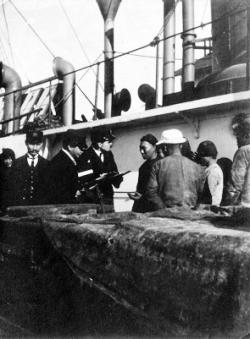 On August 24, 1874, California’s commissioner of immigration Rudolph Piotrowski found 22 women aboard the American Steamer Japan who looked suspicious because they were traveling without families. He called them lewd, ordered a payment of $500 dollars for each woman to disembark (keep in mind a horse was around $20 back then). When the payment demand was refused, he detained the women and ordered for them to be shipped back to China.
On August 24, 1874, California’s commissioner of immigration Rudolph Piotrowski found 22 women aboard the American Steamer Japan who looked suspicious because they were traveling without families. He called them lewd, ordered a payment of $500 dollars for each woman to disembark (keep in mind a horse was around $20 back then). When the payment demand was refused, he detained the women and ordered for them to be shipped back to China.
A lawyer was hired for the 22 women, probably by Chinese merchants, and after losing at the local and California court level, their case Chy Lung vs. Freeman was eventually won with the Circuit Court and finally the Supreme Court. Fast forward 136 years, and Arizona and other states have passed laws that basically do everything that Chy Lung vs. Freeman had overturned, highlighting exactly why Asian Pacific Islander American studies should be an integral part of the American education system.
The main reasons for Supreme Court Justices like Stephen Field and Samuel Miller to rule in the women’s favor was that allowing states to determine immigration laws gave too much power to petty state officials and, more seriously, gave states too much international relations power. Basically, the whims of a small time immigrant official who made a judgment on a person solely based on outward physical appearances could actually drag the entire nation into a war. Clearly, no one state should have the right to drag the rest of us into a war just because of some guy who didn’t like the way someone looked when they stepped foot on American soil. Abuse of power, racism, and oppression aside, it’s just stupid governing. So, someone explain to me why Arizona thought it was a great idea to start making international relations decisions that not only usurps the joint power of all the states as a unified federal entity but also puts the rest of us in jeopardy on the international arena?
The whole racism and civil rights argument against the Arizona immigration law is one thing, but even the most racist idiot that’s too clouded by xenophobia and too busy scapegoating foreigners for our own economic problems should be able to see the obvious threat of a single state attempting to make decisions for the entire nation without the consent of all the other states. Maybe a new chant of “no international relations without representation” should be added to our American history books.
In any case, reading the article The Case of 22 Lewd Chinese Women by Paul A. Kramer on Slate really drove home the key place API studies and history has in America’s education. Cases like Chy Lung vs. Freeman should be up there with Plessy vs. Ferguson or Brown vs. Board of Education. Or, if you think this seemingly obscure API case of 22 lewd Chinese women and it’s upholding of human rights, international relations, and federal jurisdiction isn’t important enough, how about a case which upheld the right of every American born child to citizenship in the United States?
As highlighted on p. 140 of Iris Chang’s The Chinese in America, Wong Kim Ark was a U.S. born American of Chinese heritage who visited his parents in China at 1894. When he tried to come back a year later, his entry back to the States was denied. The case was taken all the way to the Supreme Court who ruled on March 28, 1898 that anyone born in the United States is an American citizen even if their parents are denied citizenship.
Or, if you haven’t heard of Fred Korematsu, the first Asian American in the history of the United States to have a day named after him for fighting a hard battle against the American government during WWII Japanese Internment camps, educate yourself about what he did because Korematsu v. United States is recognized by Time as one of the top 10 landmark Supreme Court Cases.
Asian Pacific Islander American history is not the history of an obscure and tiny minority group, it is simply American history. The struggle for Asian American Studies on college campuses has been a long and hard one, but it’s created wonderful programs of study and generated so much important scholarship that has contributed to America’s rich history. It’s so great in fact, that we should start younger. Maybe if the voters of Arizona had learned more API history in their 5th grade American history curriculum, learned about the 22 women from China who were unfairly detained by a state that was overstepping its jurisdiction, learned about the struggles of API like Wong Kim Ark who had to fight to keep his natural birthright citizenship, and knew about Korematsu’s fight for the civil liberties of all Americans by taking on the United States itself, then maybe, just maybe, less of them would have voted to allow people to be legally harassed based on the color of their skin. It’s definitely worth a try.
[Photo coutesy of Slate]







